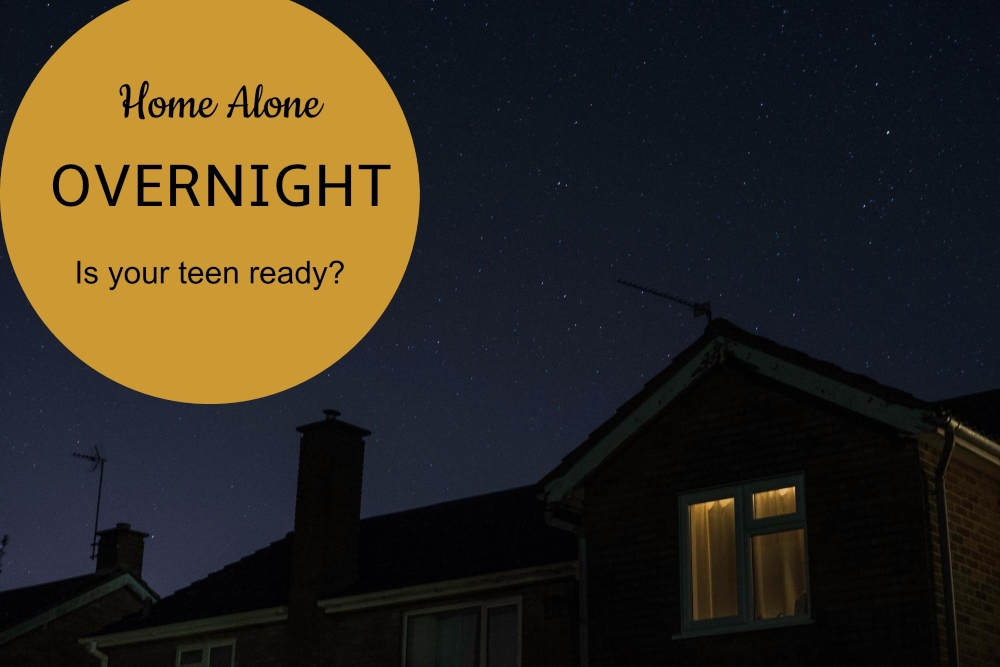Guest blog by Andy Earle.

Is Your Teen Ready to Stay Home Alone Overnight?
We’ve all heard the horror stories of a parent-free house leading to a breeding-ground for drunken parties, things getting broken, and even pregnancies. However, it’s hard to get a babysitter for your teen as they get further into high school, and at a certain point, they have to learn how to be responsible on their own.
If you’re wondering if your teen is ready to be home alone overnight, here are some things to consider.
It’s Not About Age, It’s About Maturity
There is no perfect age to decide when your teen can stay home alone, but there are a few ways to gauge if they are mature enough.
Maturity Factor #1
First, ask yourself if your teen can resist peer pressure. If they give in social pressure easily, they might be more likely to use the empty house irresponsibly. Friends can easily take advantage of the parent-free zone, so your teen needs to be able to say “no” to pressure from peers.
Maturity Factor #2
The next maturity factor is knowing how to respond to an emergency. If your teen knows how to act responsibly if something were to go wrong, they might be safe at the home alone. For example, if there is fire or they get injured, would they be able to handle the situation without panicking and call for help? If not, maybe they shouldn’t be home alone.
Maturity Factor #3
Your teen might demonstrate maturity by following rules, guidelines, and laws. If your teen demonstrates defiance, or can’t follow the rules responsibly, it might be too risky to leave them unattended overnight. Whatever ground rules you set might be thrown out the window, leading to unwanted guests or activities.
Maturity Factor #4
Another question you want to ask yourself is, does my teen exhibit good decision-making? If they are able to make the right choices in new, or challenging situations, they might be mature enough to stay home alone. Teens have a cognitive bias that makes it hard for them to consider many options when making choices, so it’s important to look at their past behavior as an indication for the future. A pattern of good choices means you can be more certain than they will handle an unexpected circumstance logically and carefully.
Maturity Factor #5
A final gauge of maturity is if your teen can handle being alone on an emotional level. If your teen experiences separation anxiety, fear of being alone, night terrors, or dread about potential threats like burglars, they probably are not able to have the house to themselves. Even if they make all the right choices, their emotional state could be compromised and they could have a wholly negative experience, perhaps keeping them awake at night while you’re gone.
External Elements to Consider
Other than your teen’s maturity level, you need to do some additional checks to test if your teen is ready for a night alone.
Is the Neighborhood Safe?
We suggest you consider the possibility of dangerous situations that can happen in your neighborhood. If break-ins are common in your area, it might not be safe for your teen to home alone, even if they prove that they can handle themselves in risky circumstances.
Do You Have a Neighbor to Check on Your Teen?
It can be extremely helpful to have someone check in on your teen periodically. For one, they can ensure that your teen is following the rules and not acting out. Additionally, a neighbor can double-check on the safety of your teen or help if something were to go wrong.
Did You Explain the Rules and Consequences?
Before you leave your teen alone, you need to clearly lay out the house rules and natural consequences of breaking them ahead of time. You don’t want your teen to think there will be no repercussions if they decide to act out.
Final Assessment
If your teen passes the maturity test, and you’ve double-checked all the external factors, your teen might be ready to stay home alone. If you’re still hesitant for your teen’s first time staying alone overnight, you can test the waters by having them stay home alone during the day. We suggest you slowly extend the amount of time they’re left alone at the house, or extend how late they can stay out, and if they can handle it responsibly, they might handle overnight just fine.
Andy Earle is a researcher who studies parent-teen communication and adolescent risk behaviors. He is the co-founder of talkingtoteens.com and host of the Talking to Teens podcast, a free weekly talk show for parents of teenagers.
Related Content:


